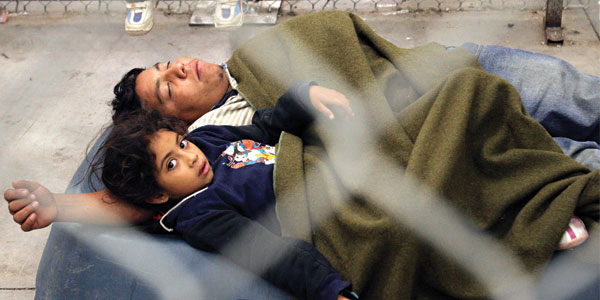Mientras la llegada de menores y familias que piden refugio continúa aumentando, oficiales de los Estados Unidos están haciendo poco para tratarlos de manera justa, según el abogado de inmigración Roger McCrummen y asistente legal de inmigración Ramón Valdez.
Valdez y McCrummen son voluntarios con el grupo Refugee and Immigrant Center for Education and Legal Services (RAICES) para proporcionar representación legal gratuita a las familias.
“Cuando los refugiados llegan a la frontera y legalmente piden refugio, los Estados Unidos tiene la obligación de tratarlos de una manera humana”, dijo Valdez. “En lugar de ello, se les trata como criminales.”
Recientemente, las compañías de prisiones privadas entregaron una solicitud para obtener licencias centro de cuidado de niños para sus centros de detención en Texas. Varias organizaciones están pidiendo al estado que no otorguen las licencias de cuidado de niños.
De acuerdo con testimonios de algunas de las familias detenidas, los niños muestran señales de depresión, reciben poca atención médica y mucho menos educación o asesoramiento.
Según McCrummen, el argumento es que los centros de detención se mantienen deliberadamente en esas condiciones para ayudar a prevenir la entrada de grandes multitudes de inmigrantes en el país. Valdez no está de acuerdo con el argumento.
“Muchas de las mujeres con las que hablé estaban abandonando carreras de ingeniería y de enseñanza, empresas y propiedades”, dijo Valdez. “Era obvio para mí que la única razón por la que habían salido de sus casas era para proteger a sus familias, no a buscar empleo en los Estados Unidos”.
Según McCrummen, las cárceles privadas contratadas por Inmigración y Control de Aduanas obtienen ganancias muy grandes de los centros de detención, que van desde $200 a $300 por persona cada día. La Corrections Corp. of America, una prisión grande, con fines de lucro privado, recibió un aumento de ingresos de $49 millones respecto al año anterior, en gran parte atribuido a la detención de familias inmigrantes.
Valdez y McCrummen están dedicados a dar a conocer los hechos y alentar al público a ayudar a RAICES para recaudar dinero que ayudará a pagar los bonos para sacar a las familias de las prisiones. Para obtener más información, visite raicestexas.org/pages/bondfund o contacte a Valdez: ramon@kcimmigrationlaw.com.
________________________________________________________________________________________________
Immigrants treated inhumanely in detention centers
By Melissa Arroyo
As the arrival of unaccompanied children and families asking for refuge continues to increase, the United States is doing little to accommodate them in a humane, fair manner, according to immigration attorney Roger McCrummen and immigration paralegal Ramon Valdez.
Valdez and McCrummen volunteer with the Refugee and Immigrant Center for Education and Legal Services (RAICES) to provide pro bono legal representation to those families.
“When these refugees come to the border and legally ask for refuge, the United States has an obligation to treat them humanely,” Valdez said. “Instead, they are treated like criminals.”
Recently, private prison companies filed to obtain child care center licensing for their detention centers in Texas. Several organizations are petitioning the state to deny the childcare licenses. According to testimonies from some of the detained families, the kids show signs of depression, receive poor medical care and no education or counseling.
According to McCrummen, the argument is that the detention centers are deliberately kept in those conditions to help deter large waves of immigrants from entering the country. Valdez finds the argument invalid.
“A lot of the women that I spoke with were leaving behind engineering and teaching careers, businesses and property,” Valdez said. “It was obvious to me that the only reason they had left their homes was to protect their families, not to seek employment in the United States.”
According to McCrummen, the private prisons contracted by Immigration and Customs Enforcement make significant profits from the detention centers, varying from $200 to $300 per person each day. The Corrections Corp. of America, a large, for-profit private prison, saw a revenue increase of $49 million over the previous year, largely attributed to the detention of immigrant families.
Valdez and McCrummen are working to raise community awareness and encourage the public to help RAICES raise money to help pay the bonds that will release the families. For more information, visit raicestexas.org/pages/bondfund or contact Valdez at ramon@kcimmigrationlaw.com.











